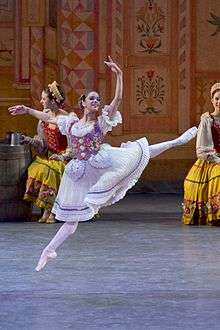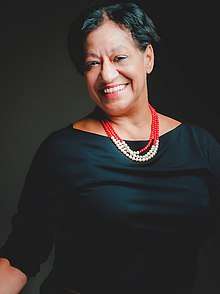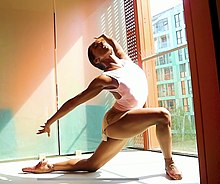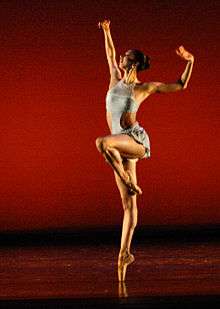List of African-American ballerinas
The history of African-American ballerinas in the American ballet world is a scarce one due to racial issues and the question of whether or not African Americans had the body type to fit into this world.

The ballet world changed its look about half a century ago. More companies are catering to the idea of talented African Americans in ballet, and some have even made them the faces of their companies. The idea of African Americans in the world of ballet was a rarity, because many of them lacked the opportunity to participate in the art. Black dancers typically fit into rebellious dance, practicing Graham, Limón, and Horton. However, some dancers managed to stay true their techniques and commit to making a mark in the American ballet industry.
In 1969 Arthur Mitchell, the first African-American principal male dancer with a major ballet company, the New York City Ballet, founded the Dance Theatre of Harlem as a reaction to the assassination of Martin Luther King Jr. That predominantly "colored" company gave many opportunities to all races to dance the classics as well as ballets by Balanchine and other living choreographers.
African-American ballerinas
Raven Wilkinson
Raven Wilkinson was one of the first African-American ballerinas allowed to join a ballet company. During the 1950s, she danced with the Ballets Russes under the condition that she pose as a white woman by painting her face. After two years of increasing racial discrimination, including threats in the South, she left Ballets Russes and eventually landed a spot in the Dutch National Ballet.[1]
Janet Collins
Janet Collins is the first African American to perform with the Metropolitan Opera ballet. She faced some of the same racial controversies as Raven Wilkinson with Ballets Russes before joining the Metropolitan Opera.[2]
Debra Austin

Debra Austin was the very first African-American ballerina to receive a principal dancer contract with a major American ballet company[3] in 1982 with the Pennsylvania Ballet. There she danced the principal roles in Swan Lake, Giselle, Coppélia, and La Sylphide. Dancing these roles with a white partner was a further breakthrough. Before that time, starting in 1974, Austin was dancing principal and solo roles in George Balanchine's New York City Ballet. Balanchine himself choreographed solos for her as did John Clifford who gave her her first principal role in his ballet Bartók No. 3 (to Piano Concerto No. 3)[4] which was noticed by The New York Times[5] as an historical first for that company.
Lauren Anderson
Lauren Anderson is the first African-American principal dancer of the Houston Ballet.[6]
Llanchie Stevenson
Llanchie Stevenson was the first African-American dancer at Radio City Music Hall Ballet Company and later at the National Ballet of Washington, D.C.. She was a founding company member and principal dancer at Dance Theatre of Harlem.[7]
Aesha Ash
In 1996, Aesha Ash became a member of the New York City Ballet. She was the only African-American during most of her career.[6][8]
Misty Copeland
Misty Copeland had a late start in dance, but became one of the few African-American ballerinas to be appointed as a soloist.[9] In June 2015, Copeland became the first African-American female principal dancer in American Ballet Theatre's 75-year history.[10]
Michaela DePrince
Michaela DePrince was born in Sierra Leone and has vitiligo, and adopted by an American couple at age four, and started ballet soon. She was featured in the 2011 ballet documentary First Position. Her career started in Dance Theater of Harlem, and was the youngest dancer there. She then join the Dutch National Ballet, though at the time she is the only dancer of African origin. She is now a soloist at the company.[11]
Precious Adams

Precious Adams trained at the Bolshoi Ballet Academy in Moscow, Russia, but faced discrimination due to her race including being left out of performances, being prevented from taking part in auditions, and being told to "try and rub the black off."[12][13][14] She joined the English National Ballet in 2014, and was promoted to First Artist in 2017.[15] In September 2018, Adams announced that she would no longer perform on stage while wearing pink tights, instead wearing brown tights to match her skin tone. She received criticism from within the ballet industry for her decision, but was supported by the director of the English National Ballet, Tamara Rojo.[16]
Anne Benna Sims
Anne Benna Sims was the first African-American danseuse at American Ballet Theatre (ABT) and the first African-American soloist in the company's history. Sims danced with Les Grands Ballets Canadiens in 1972. At ABT she was in the first cast of the company premiere of Paul Taylor's Airs (reconstructed by Eileen Cropley); other members of the cast were Lisa Rinehart, Janet Shibata, Rebecca Wright, Brian Adams, Warren Conover and Robert La Fosse. She had earlier been featured in a revival of Antony Tudor's Undertow with Peter Fonseca.
Virginia Johnson
Virginia Johnson was a founding company member and prima ballerina of Dance Theatre of Harlem[17]—known for being the "first Black classical ballet company" and "the first ballet company to prioritize Black dancers". She joined Dance Theatre of Harlem under its co-founders, Arthur Mitchell and Karel Shook, in 1969 when the company was founded. In 2009, Johnson returned to Dance Theatre of Harlem as the company's artistic director.[17]
Karen Brown
Karen Brown danced for Dance Theatre of Harlem from 1973 to 1995. She worked with Arthur Mitchell, Frederic Franklin, Alexandra Danilova, Agnes de Mille and Geoffrey Holder. She served as director of education at the Atlanta Ballet Center for Dance and was the first African-American woman to direct a ballet company when she served as artistic director of Oakland Ballet Company in California.[18]
Alicia Graf Mack

Alicia Graf Mack joined the Dance Theatre of Harlem at the invitation of Arthur Mitchell, but left the company at age 19 due to injuries. After she finished a degree at the Columbia University School of General Studies, she rejoined the company as a principal dancer, and stayed until the company disband in 2004. She joined the Alvin Ailey American Dance Theater the following year.[19][20] She left in 2008 due to another injury, then finished a master's degree, and joined the faculty of Webster University.[21] She danced with the Ailey company full-time between 2011 and 2014.[22][23] After that, she started teaching at University of Houston. In 2018, she became the director of dance division at Juilliard School. She is the first women of color and youngest person to hold this post.[24][25]
Olivia Boisson
Olivia Boisson is a dancer with New York City Ballet.
Sydney Magruder Washington
Sydney Magruder Washington is a ballet dancer and mental health advocate.
Chyrstyn Fentroy
Chyrstyn Fentroy is a dancer with Boston Ballet.
References
- Clark Hine, Darlene (ed.), Black Women in America: An Historical Encyclopedia, Vols 1 and 2, New York: Carlson Publishing Inc., 1993.
- Dunning, Jennifer. "Janet Collins, 86: Ballerina Was First Black Artist at Met Opera." The New York Times, May 31, 2003.
- " Pioneering dancer proves her point(e) " by Martha Quillin, The News & Observer, July 13, 2016
- Bartók No. 3, New York City Ballet
- "The Ballet: Bartok No.3 by Clive Barnes, The New York Times, May 25, 1974
- Kourlas, Gia (May 6, 2007). "Dance: Where Are All the Black Swans?". The New York Times. Retrieved February 22, 2012.
- "Llanchie Stevenson – MOBBallet.org". mobballet.org. Retrieved 17 March 2018.
-
- "Ash, Aesha (1977– )" by Olga Bourlin, blackpast.org, January 24, 2013
- "She's on Point: After seven years, ABT ballerina Misty Copeland becomes a soloist". Sixaholic. 2007
- Cooper, Michael. "Misty Copeland Is Promoted to Principal Dancer at American Ballet Theater", The New York Times, June 30, 2015. Retrieved June 30, 2015.
- Siegal, Nina (13 March 2015). "For Michaela DePrince, a Dream Comes True at the Dutch National Ballet". The New York Times.
- "U.S. Ballerina Faces Discrimination at Bolshoi Academy". Themoscowtimes.com. Retrieved 8 August 2018.
- Faines, Ayesha K. (7 July 2015). "10 Black Ballerinas Other Than Misty Copeland Who Are Also Changing the Face of Ballet". Atlanta Black Star. Retrieved 7 August 2018.
- Mackrell, Judith (28 November 2013). "Everyday racism: how to be a black ballet dancer in a white world". The Guardian. Retrieved 8 August 2018.
- "Precious Adams". English National Ballet. Retrieved 16 April 2020.
- "Ballerina Precious Adams explains why she won't wear the traditional pink tights: 'I'm not colourblind". The Independent. Sep 20, 2018. Retrieved 16 April 2020.
- "Meet Virginia Johnson: From Prima Ballerina to Dance Theatre of Harlem Artistic Director". Pittsburgh Ballet Theatre. 2017-03-14. Retrieved 2018-03-06.
- "Karen Brown". mobballet.org. Retrieved 2019-10-01.
- Wood Rudulph, Heather (December 29, 2014). "Get That Life: How I Became a Professional Ballerina". Cosmopolitan.
- Kwon, Beth (2006). "Pointe Taken". Columbia Magazine.
- Rizvic, Veneta (September 25, 2015). "Alicia Graf Mack discusses challenges in life as a dancer (Video)". St. Louis Business Journal.
- King, Susan (March 8, 2013). "Dance Spotlight: Alicia Graf Mack on keeping Alvin Ailey legacy alive". Los Angeles Times.
- "Portrait: Alicia Graf Mack". Juilliard School. August 28, 2018.
- Barone, Joshua (April 10, 2018). "Juilliard's New Dance Director Comes From Ailey and Ballet". New York Times.
- Holmes, Kathryn (January 2, 2020). "A Day in the Life of Alicia Graf Mack, Head of Juilliard's Dance Division". Dance Teacher.